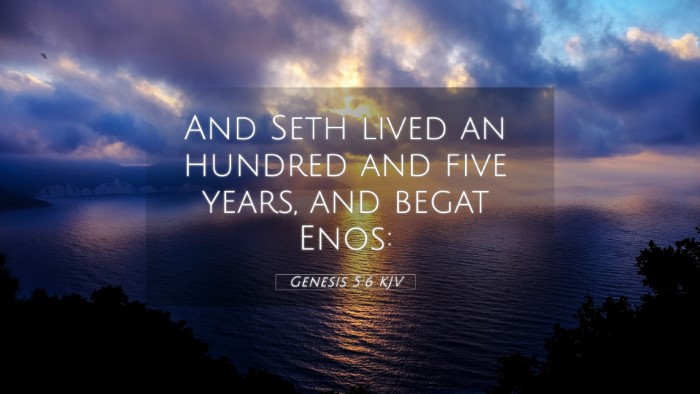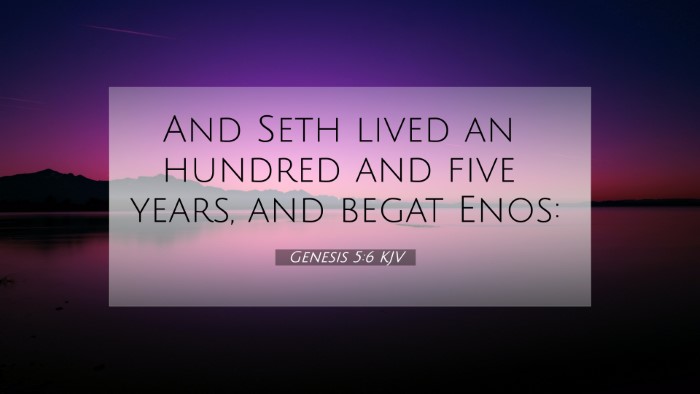Genesis 5:6 - Summary and Commentary
Verse: "And Seth lived an hundred and five years, and begat Enos:" (Genesis 5:6)
This verse forms a part of the genealogical account in Genesis 5, detailing the lineage from Adam through Seth. The significance of Seth's age and his offspring, Enos, represents not only the continuation of the human race but also the unfolding of God's redemptive plan.
Combined Insights from Commentaries
Matthew Henry's Commentary
Matthew Henry emphasizes the importance of Seth as a godly line after Abel's murder by Cain, underscoring the idea of grace and divine providence. He notes that Seth’s age at fatherhood suggests a time of maturity and readiness, parallel to God's purpose in establishing a righteous line through which the Savior would come.
Albert Barnes' Commentary
Albert Barnes elaborates on the significance of Enos' birth. Enos's name means "mortal man," indicating the frailty of human life and the necessity for divine assistance. Barnes connects this to the larger theme of humanity's need for redemption and restoration throughout scripture.
Adam Clarke's Commentary
Adam Clarke provides a more detailed chronological interpretation of Seth's age, proposing that this lineage plays a crucial role in the fulfillment of divine prophecies. Clarke indicates that Seth’s lineage preserves the knowledge of God, which would later be instrumental in the establishment of the covenant with Abraham.
Bible Cross-References
- Genesis 4:25: The mention of Seth coming after Cain's sin establishes the continuation of the godly line.
- Genesis 5:3: Adam's response to God's command, paralleling Seth's birth and the continuation of humankind.
- Luke 3:38: The genealogy in the New Testament tracing back to Adam through Seth signifies the importance of Seth's line.
- Hebrews 11:4: Abel is noted for his faith, which contrasts with Cain's actions and highlights the significance of Seth as a restoration.
- Romans 5:12: This verse discusses sin's entry into the world through Adam, linking the necessity for a righteous line through Seth.
- Genesis 10:25: The birth of Peleg, drawing a connection through genealogical lines and the dispersal of nations.
- 1 Chronicles 1:1: Acknowledges Adam and leads into the genealogical record, affirming the importance of these early figures.
- Matthew 1:2: The genealogy of Jesus relates back to Abraham, reiterating the significance of earlier generations beginning with Adam and Seth.
- Acts 17:26: Speaks of all men coming from one blood, reinforcing the connection through Adam and Seth.
- 1 John 3:12: Emphasizes the righteousness in the descendants of Seth and contrasts it with the wickedness of Cain.
Thematic Connections
The themes explored in Genesis 5:6 also tie into various Biblical motifs such as:
- Divine Providence: God's sovereign plan through genealogies.
- Redemption: The lineage of Seth leading to the Messianic promise.
- Human Frailty: The birth of Enos illustrating the mortality of man and the need for divine grace.
- Faith and Obedience: The importance of continuing in the ways of the Lord as seen in Seth’s righteous line.
- Generational Faith: How each generation contributes to the unfolding of God’s redemptive plan.
Conclusion
The genealogical account in Genesis 5:6 serves as a foundational verse that highlights essential themes of faith, redemption, and the intricate connections that tie different parts of the Bible together, making it an important verse for both study and contemplation. Understanding these connections through tools for Bible cross-referencing, allows for a deeper insight into the overarching narrative and the themes of creation, fall, and redemption that run throughout Scripture.



